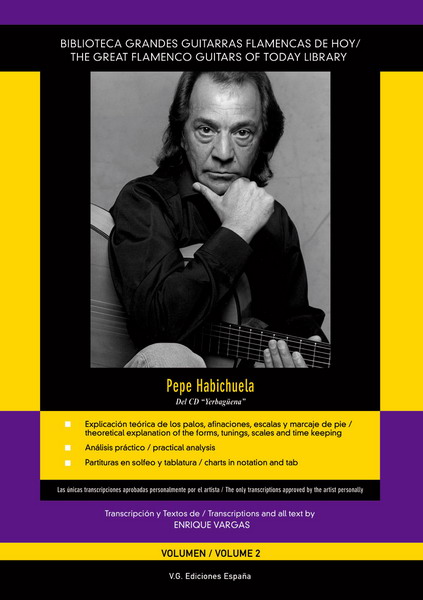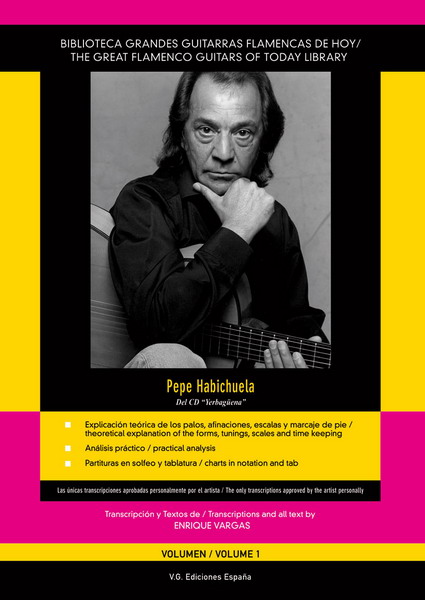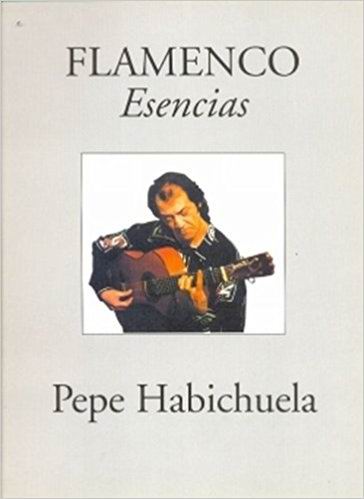Description
At last, the long-awaited transcription of the historic CD ''Yerbagüena'' by Pepe Habichuela has been released as an addition to maestro Enriqie Vargas ' ''Great Flamenco Guitars of Today Library''. This two-volume edition, as all others within this Library, carries a hand-written exclusive authorization by the author of the music.
This CD is considered historic for the following reasons: one, it is the first album that fuses Gypsy flamenco with the music of India, the homeland of the Romá (Gypsies). The ease with which Habichuela's guitar blends with the colorful Indian melodies of the Bollywood Strings, full of microtones and oriental embellishments is truly astonishing. Two, this work is a fruit of the combined effort of four different members of this outstanding flamenco family, the Carmona: maestro Pepe Habichuela; his son Josemi, himself a great guitarist, composer, arranger and producer; Juan Carmona, guitar virtuoso and also a great composer; and, last but not least, Antonio Carmona, an extraordinary percussionist.
The music on CD exudes the joy of living, pure and sincere as the ancestral wisdom of the Gypsy, who, through the thousands of years and miles preserved their soul and their art.
The transcription opf ''Yerbagüena'' was complicated by the abundance of Indian instruments, two and sometimes three guitar tracks, singing, etc.. Surprisingly, maestro Vargas not only transcribed all the guitar tracks, but also arranged the most important parts played by the Bollywood Strings, the oud and the mandola for the second guitar. As a result, this work offers flamenco material for solo guitar as well as duos and trios. No need to say, flamenco pieces for more that one guitar have been virtually non-existent on the chart market. It should be added that all the tunes from this CD are perfectly playable on a solo guitar.
As in all of his books, Enrique Vargas offers detailed explanations on the forms included on the CD, foot marking, tonalities, the basics of the harmonic and melodic language of each form as well as the analysis of the most difficult compás, falsetas and technical aspects of the artist's style. This turns each book into a mini-manual of flamenco in general and the personal style of each guitarist in particular.
This transcription is an important addition to the “Great Flamenco Guitars of Today Library”.
In this bilingual English/Spanish edition, the sheet music is presented in staff and tablature formats with complete fingerings for both hands.
Enrique Vargas is the author of the texts and the transcription, approved exclusively by the artist.
BOOK 2
''Como un fandango'' (tanguillos)
This piece was recorded by four Carmona: Pepe, Josemi, Juan and Antonio. The sublimely elegant oud solo by Juan Carmona has been transcribed for the second guitar. The piece can be played as a duo or a guitar solo. Priceless for a guitarist who wishes to learn this difficult form.
''Tres colores'' (bulería)
An extraordinary example of collaboration between all four Carmona involved in this project. Three powerful guitars by Pepe, Juan and Josemi as well as intricate percussion by Antonio. Each guitarist, with his own manner of feeling the music, the falseta, the compás, etc.. Three guitarists, so different and at the same time so united in their ancestral flamenco sensibility. Pepe, playing in the traditional tonality por medio (A Hijaz) with the capo on III, as an example of tradition and purity, Josemi (C# Hijaz, no capo), an embodiment of modernity in flamenco, Juan ( por minera , capo on V), also so modern and so traditional at the same time. And all three, infinitely elegant. An excellent source of falsetas and compás in three different tonalities and styles.
'' En el Grec '' (seguiriya)
This guitar solo recorded live at the Grec festival is a great reference for any guitarist who wants to learn this form, since Pepe Habichuela is considered one of the best players of the seguiriya. This piece is very authentic and rhythmically sophisticated. Most of it is played to the steady compás that goes faster than usual.
''Yerbagüena (Occidente)'' (rumba)
This rumba is very similar to the one that opens the CD, but the arrangement of the second guitar that is very different. This arrangement is a testament to Josemi's powerful imagination, as well as his extraordinary arranger's skills. In this version the maestro's son interprets the melody of the verse on the mandola, with unbelievable elegance and sensibility. This solo has been transcribed for the second guitar.









































 Wholesalers/Stockists
Wholesalers/Stockists Contact
Contact







